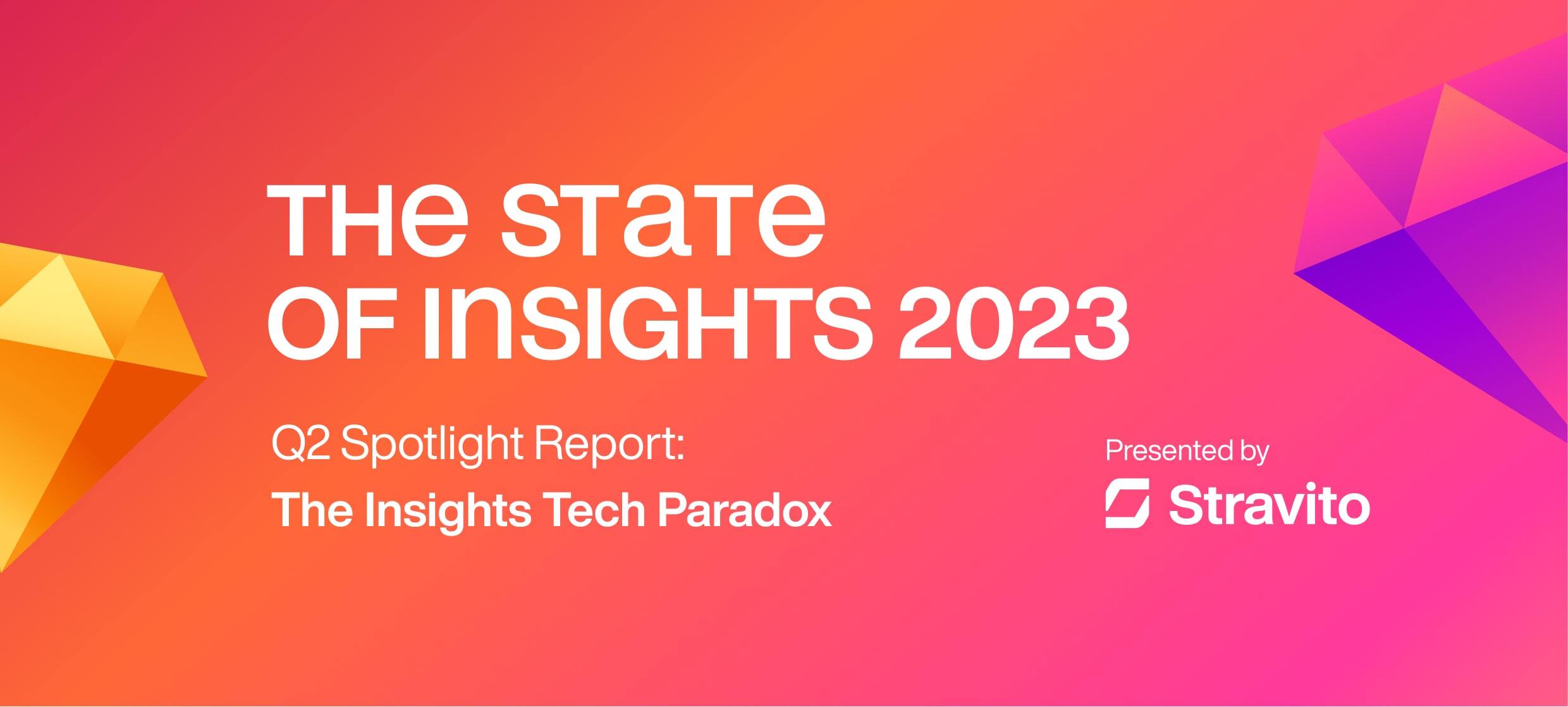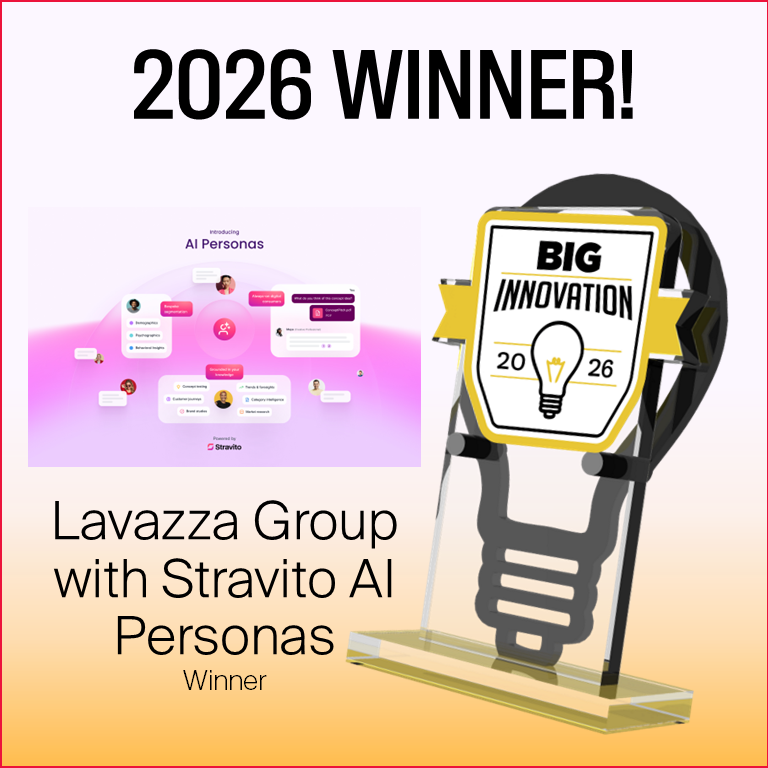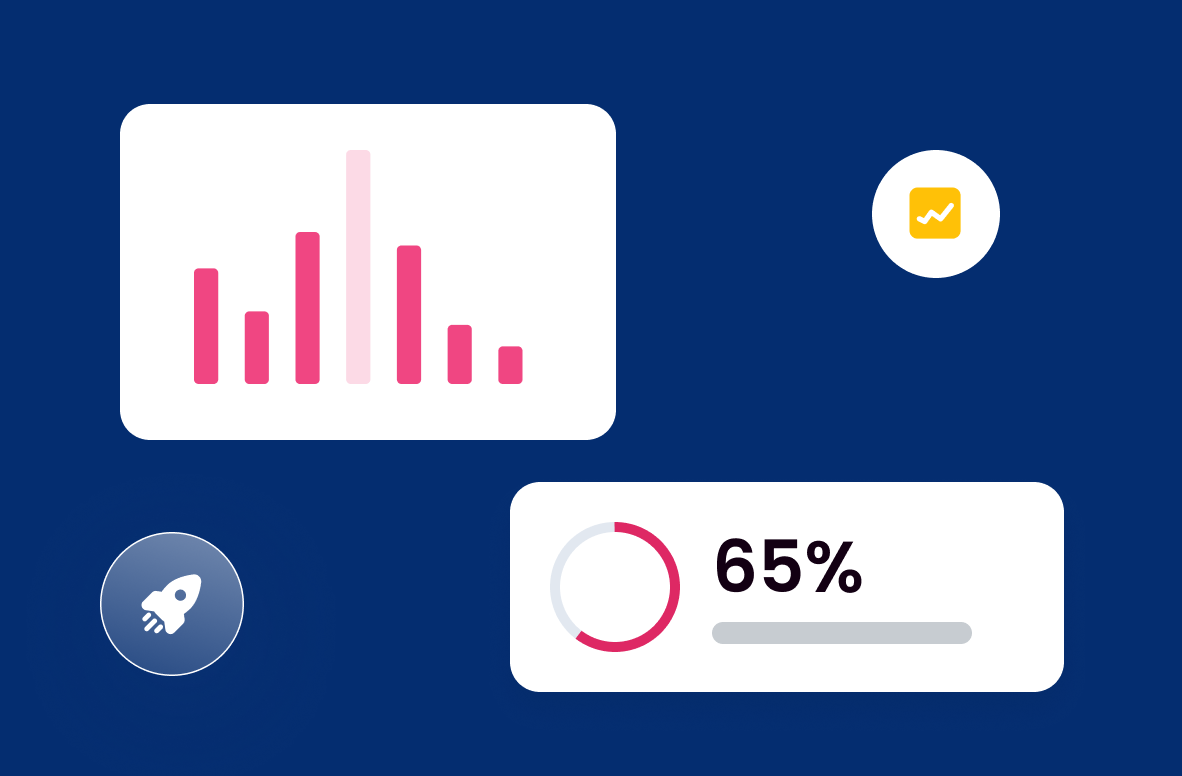The pace at which technology is evolving means that it currently is and will inevitably continue becoming an increasing part of our work lives. In fact, for many of us working in geographically dispersed, hybrid, or fully remote teams, our workplaces have become partially or fully digital.And as tech continues to become a bigger part of our lives, more questions will arise around our relationship with it and the subsequent impacts on our wellbeing.This journey can be complicated, but it doesn’t have to be. A simple solution lies in putting humans first.And paradoxically, to achieve that, companies need to be tech-forward.From “The Paradox of Insights Tech”, May 2022
Just over a year ago, we reflected on what we call “the paradox of insights tech”– the notion that insights tech is essential, but it’s not the point.
While a lot has happened in the last year with the rise of technology like generative AI, the sentiment above remains true.
It's essential to stay up-to-date with the latest tech, but that's not really the point. Because what will ultimately determine whether or not your team falls behind is how you spend your time once that new tech is in place.
On the last 7 episodes of the Consumer Insights Podcast, we’ve zoomed in on how insights leaders view the role of technologies like AI in insights work, as well as what skills they think are essential for success in tomorrow's workplace.
In this new spotlight report, we delve into the dynamic interplay between insights professionals and technology, highlighting implications for the future of insights work.
Overview:
- Tech creates both new opportunities and new challenges
- Human expertise is still a necessity
- Future-proofing the insights function
- To put people first, be tech-forward
1. Tech creates both new opportunities and new challenges
Many of the conversations on the past quarter of the Consumer Insights Podcast explored the nuances of how tech can impact us and our work. While emerging applications of tech like AI bring new opportunities, it's also evident that there are plenty of new challenges to look out for as well.
Tech can make you redundant – in a good way
Bhaskar Roy, Client Partner APAC at Fractal, a leading AI provider to Fortune 500 companies, highlighted the opportunities that automation can create for your career development. By automating as much of your work as possible, you create more time to learn and develop. He explained:
The best advice was from my first or the second manager that I had in the organization, and it links back to the whole learning aspect that I mentioned earlier as well. He basically said, “For you to continue growing and continue learning in your career, it's important that you make yourself redundant to your current role.”
And as I broke that down, in my mind, that essentially meant a couple of things.
One, first and foremost, you should not need to be actively doing your current job. That's when you'll have time to learn. Now, to be able to get to that stage, you need to automate what you can in your current job and get it out of the way.
And from that, comes in opportunities of then realizing where there are synergies across different kinds of work that you might be doing and then explore that to create sort of a product or an accelerator that can do more than just that small piece of work that you were doing.
Efficiency and creativity go hand-in-hand
Miranda Patton, Director of Strategic Insights at AT&T, also saw the right tools as a way to reclaim time. She emphasized that the right tech creates opportunities for deep work by getting non-creative work out of the way.
Market researchers having the right tools, I think, can be game-changing. This AI that's coming out – I'm still learning a lot about it. We're using it in some instances, but I think making sure to be open to that and staying up to date, making sure you know how to use it so that you're not left behind, and you're able to leverage the efficiencies that they bring to your job.
And then 2, I would add onto that to say research to me, it's a creative art. And the more tools you can use, the more processes you can put in, just to get some of the non-creative work out of the way, so you can spend more time on the brainpower and the really good gold that comes out of sitting down and developing insights. I think that's very critical for researchers to have the right tools.
AI can counter human biases – but also brings its own
Andi Govindia, CEO and Co-founder of Riviter, a predictive intelligence provider that specializes in social graphing AI and visual search, discussed how AI can help to counteract human bias, with the caveat that it has its own biases of course.
What I found in my experience with things like the open AI tools is that they're really good at bringing hidden things to the surface. So as we converse with people, we all inevitably come with our biases. We hear things that we have anchors for that resonate with us, and then we tend to ignore accidentally things that we don't have a reference for.
AI is biased, but not in the same way. So it doesn't necessarily know what I think is important, it knows what it thinks is important. And ideally, you have a different partner in that AI, someone who has different biases, in a sense, to be able to see those things.
Tech will accelerate change in the industry and beyond
Emilia Simonin, Head of Global Market Intelligence at Moët Hennessy, discussed how technology speeds up change in the world around us. She highlighted this as a challenge for insights teams to adapt their ways of working to prepare for the future.
The world is changing really fast. We know that technology speeds everything up and I don't have the answer. But the question I pose to our industry is are we equipped for the next decade, the next 20 years, 30 years, 50 years? What does a consumer's world look like in 50 years time? How do they behave, how are we going to track it, and how are we going to make that impact? I think in the future is a question I ask myself as well.
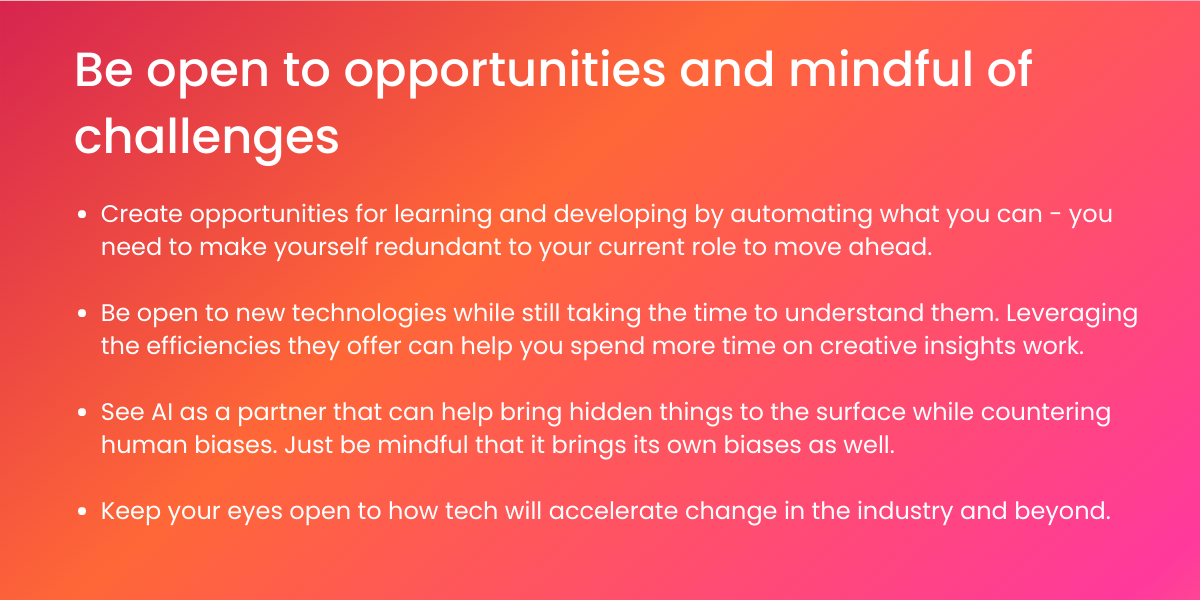
2. Human expertise is still a necessity
While AI can reduce the amount of repetitive or non-creative tasks, it is also clear that human expertise is still needed in a variety of areas. The insights leaders on this past quarter of the podcast highlighted how in many ways the core of insights work is still human.
Insights still need to be validated and translated
Hemant Mehta, author, advisor, and former managing director at Kantar, pointed out the need for both internal and external human expertise. An external agency can offer much needed perspective and help brand-side insights professionals to see things more clearly. He also highlighted the need for validating insights that come from algorithms and translating them into consumer language.
A lot of times you need an external mirror. Somebody to put a mirror in front of you and say, “Hey, this is the reality of your business or your brand. This is what your end users are talking about”, and that's where we come in. We play an extremely critical role, in two ways. One is for the consumers to bring to them better products, better lifestyles, better services, whichever way we define.
And for the business, really to make things or provide things which their end consumer wants and which can make an impact on their lives. So I think our role is very, very critical even today in an age where we are swimming with data. I personally believe that the algorithms and machines are going to throw up insights, but nobody's validating them. You can't just act upon it without saying, "Hey, you know, does this really help you?" Or how do you verbalize it, that insight, in consumer language? And that's where the industry is always going to be relevant.
The human mind is what will move the needle
Emilia Simonin (Moët Hennessy), emphasized how core the human element is to insights work, while also cautioning against an over reliance on technology:
I think outside of sort of using some platforms and software to make things more accessible, I think it's still very much a human project. I don't think that we're evolved enough to have a marketer, for example, know what to ask for... It's not just about delivering the research, it's about the strategic mindset of an insights professional. I think we are no longer just researchers, I think we are internal consultants, and we should be part of the internal strategic ecosystem where we are actually advising. So I think the human element is really hard to overcome…
I think it's the human mind, the human brain that is strategic. A robot can help us absolutely automate things and take the grunt work away from us. That would be great and it's already happening, but I think ultimately it's still going to be a human mind that is going to move the needle. So that over reliance on technology is probably a bit of a watch out for us as well.
You can't replace listening to your customers
Tzachi Ben-Sasson, Head of Global Voice of the Customer at Amdocs, underscored the importance of a customer listening program, regardless of company size or whether your company is B2B/B2C. From his perspective, financial projections and pipeline analysis can be helpful, but long term success involves really listening to customers and taking meaningful action based on that information.
If you don't have a customer listening program of any kind – and it doesn't really matter how large of a company you are or what you sell. If you're a monopoly, you don't need it. If you're not, and you don't have a customer listening program, then basically you're flying blind. If you say, “Look, you know what, yeah, we have our financial projections, and we do pipeline analysis”, all that's great. But that's basically living from quarter-to-quarter. The only thing that's going to tell you where your business is going for the long run – and again, B2B, B2C, what have you – is are you listening to your customers, and really what you're doing with what you're getting from your customers.
Don't be afraid to trust your gut
Miranda Patton (AT&T) advocated that you should trust your instincts. If something doesn't make sense from an AI engine, don't ignore your gut feeling. Instead, her advice was to conduct additional research and explore different perspectives before sharing your findings with others.
There's some things you can catch with just a good old gut check. You know, you get some kind of a response from an AI engine – it just doesn't make sense. Don't ignore that impulse. That's there in an insights professional for a reason. But I think other things we could do is just test it, you know, go and look, do your desk research and find out like are there other pieces of research that would support the outputs that you're seeing? Maybe look at it a couple different ways before you go and present it to your leadership or to others outside of your team.
Predicting the future requires the right data and the right questions
When explaining how to incorporate human centricity into predictive intelligence, Kerry-Ellen Schwartz, Director of Consumer Insights - Predictive Intelligence & Platform Innovation at PepsiCo Foods North America, highlighted how combining tracking technology, hard data, and genuine consumer understanding provides the foundation you need to scenario plan for foresights work.
From a foresights perspective, you have to kind of scenario plan. You come up with three or four different cases like “If this such and such happens, this is kind of the path we think will kind of happen for consumers and where we need to kind of meet them”. And you just plot that out. It's literally just predicting the future, so there's no good formula for it.
I think as long as you've got a really good base of data, you've got really great consumer understanding and learning, you can definitely plot out where you think things are going to go. And then you track it. You track your hard data, you track your consumer.
You can kind of see like, “Oh, I think we're headed to this scenario”. And that again leads you down what path you need to do from an innovation perspective, from a foresight perspective.
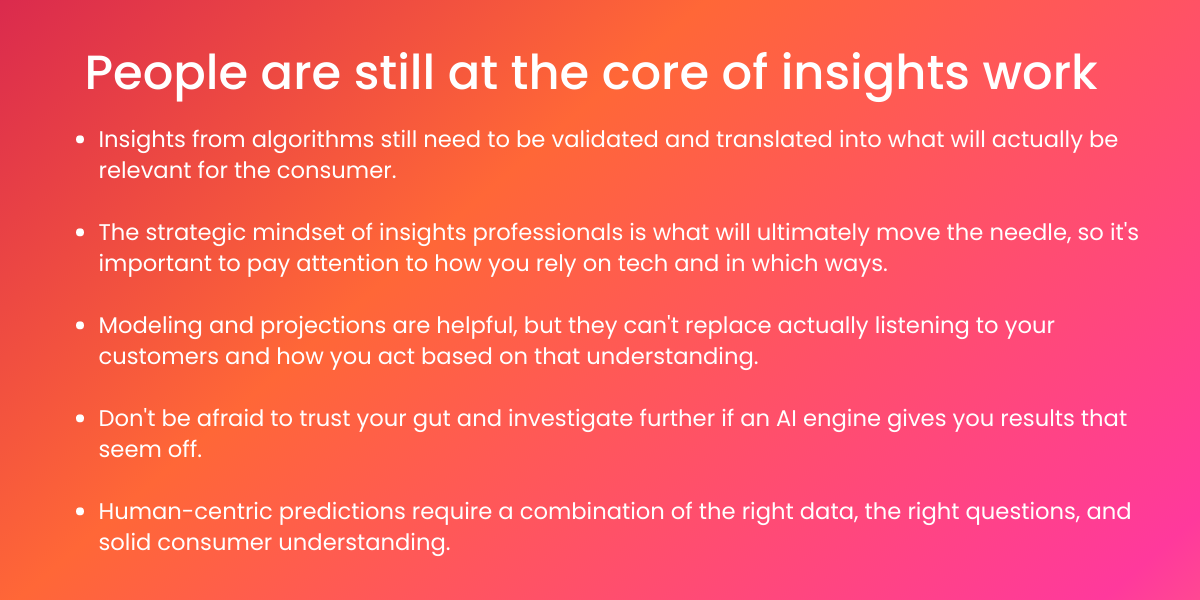
3. Future-proofing the insights function
Preparing yourself and your team for the future doesn't just mean continuously developing your technical knowledge. It also means deepening the soft skills that will be increasingly responsible for determining your team's success.
Prioritize building a team with diverse skillsets
Hemant Mehta, (prev. Kantar), discussed how successful insights teams today should combine expertise from diverse technical skillsets to deliver a strong end result. While today's technology can remove some of the heavy lifting, partnerships with people are irreplaceable.
The insights team, in my mind is today a combination of people and an insight professional needs to work with them. To bring in the best and deliver the best to the client. So I need someone who can analyze for me big data coming in, someone who can say, “Okay, the social listening is giving me this kind of insights, and let's work together. You've got your survey data, I've got data from big data or from the social data.”
Put it all together and that's really the success. So being adaptable, being able to work with different kinds of people who have their own skills and own strengths, I think is a big, big ask today. I remember when I started my career, we were seen as geeks who just like being with numbers. Or if I was a qualitative researcher, I was going through discussion transcripts of the discussion. But today, technology has come in to help me do a lot of that heavy lifting. But the partnership that I need today is not what I saw when I started my career. I need to partner with people with diverse skills, with diverse specialization for the same project, for one project, if I want to do absolute justice to my client.
Ask the right questions, choose the right partners
Kerry-Ellen Schwartz (PepsiCo Foods North America) underscored the importance of asking the right questions to your stakeholders, as well as choosing agency partners who will do the same when working with you.
There's got to be someone who is the gatekeeper in a way. Like someone who's like, “Hey, these are great questions, but what are you really looking for?” Someone who can push back.
I think that's an important skill to have, especially if you're going to be on the client side. But I'd say on the agency side too. Increasingly, I need a lot of agency partners to set me straight... I need direction as well...I really appreciate agency partners who are like, “Hey, let's have a quick call”, or kind of “Tell me what's going on so I get a better understanding of what you need” versus just saying, “Okay, yes, we'll deliver that data point for you”.
Work towards human centricity with design thinking
Bhaskar Roy (Fractal), highlighted how developing skills within design thinking can help ensure that solutions work for consumers, as well as for the stakeholder responsible for implementing those solutions.
At the end of the day, even though you are creating that solution for the customer, it is a human on the client side as well that is implementing that solution, that is going to be looking at that solution to drive that forward.
And it is that duopoly almost, if I may call it that – we need to keep playing with the customer and the implementer of that decision or system and how do you ensure that any solution that you create caters to both the needs whether explicit or latent? And how do you discover that in different ways is what we need to look at.
A classic way in which we are doing that today in different engagements is for example bringing in design thinking. You've always had panels of customers and consumers which kind of gives you feedback on what they are looking for. But then design thinking so that you ensure that you are creating the solution, keeping in mind that stakeholder who will leverage that solution at the end of the day so that both those situations or both those facets get taken care of as you create something.
Don't stop at the org chart – dig deeper
Tzachi Ben-Sasson (Amdocs) posited that it's not just a matter of developing skills, but rather behaviors. When looking to work more effectively with your stakeholders, it's essential to go deeper than the org chart and actually get to know who they are as people.
There's that cliché about you get hired for your skills and you get fired for behaviors, right? So one of the things that is crucial in stakeholder management as a first step is to really understand who your stakeholders are. And it may sound like a no brainer, but it's not going back again to the power map once you understand or better understand and it's much more difficult in an era where many of us have hybrid offices.
It's not the same as water fountain/coffee discussions and 5 o'clock beer in some cultures. But still, the first step in stakeholder management is understanding who the stakeholders are, not just the org chart. Don't settle for the org chart.
When it comes to AI, be discerning
Andi Govindia (Riviter) explained in order to successfully integrate AI into our day-to-day, it's crucial to cultivate a sense of discernment around it, paying particular attention to both the inputs and the outputs.
I think it's going to become a lot like the internet, right? We're going to have to weave it into our day-to-day. We're going to have to build a lot of discernment around how we use it, how we build capabilities around it, and how to differentiate between providers of it.
There are two kind of bits of advice that I would share in thinking about AI and that it is: think of it almost like a brain, and everything that goes into it is going to be important. And everything that comes out of it needs to be discerned.
She also emphasized that technology providers have a key part to play as well.
I think it is also the responsibility of technology providers to be open and to say, “This is something that we've done with AI. This is not human-generated, be discerning, be just as careful, if not more, as you would be with something human-produced.”
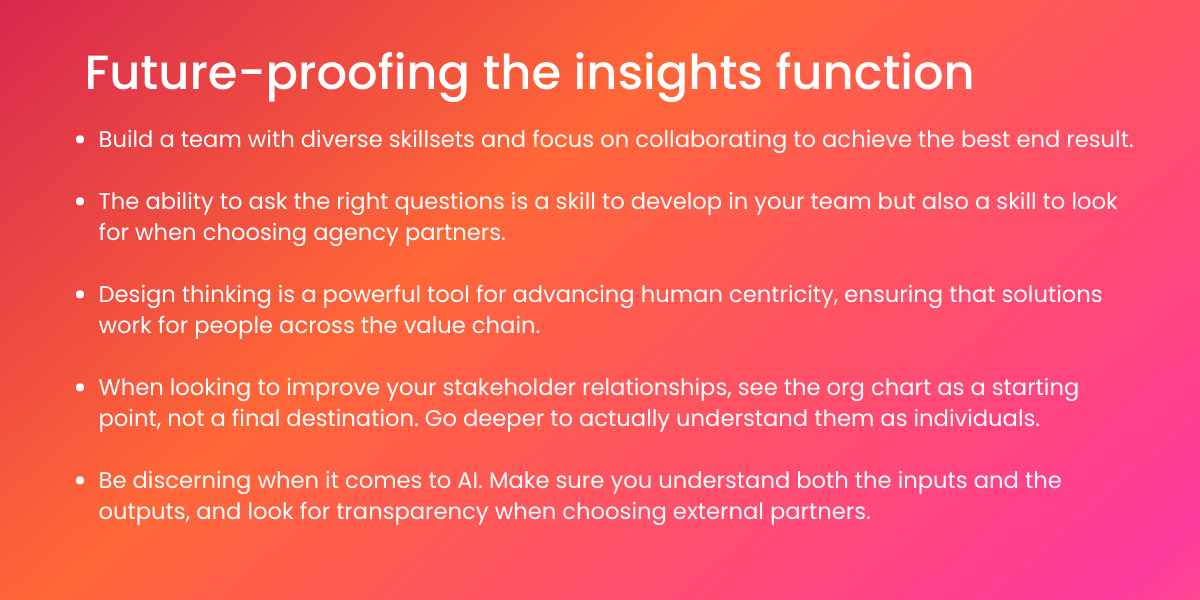
4. To put people first, be tech-forward
Stay open to opportunities and mindful of challenges
See tech like AI as a tool that can help you move ahead, be more efficient, cultivate creativity, and challenge biases. At the same time, recognize the limitations and risks of such technology, as well as the far-reaching impacts on consumers and society as a whole. Responsible experimentation is the name of the game.
Recognize the areas where human expertise is paramount and irreplaceable
Identify the areas where human expertise is necessary, and make note of the areas that are wasting it. Prioritize rearranging and automating workflows to make the most of human expertise.
Ask the right questions and surround yourself with others who will ask you the right questions
Navigating the months, quarters, and years ahead means honing your critical thinking skills, while also choosing colleagues and external partners who are doing the same.
Be discerning when it comes to AI
Understanding inputs and outputs is crucial. Know how the AI you use is trained, and know how to check the results. And if your gut tells you that something doesn't make sense, trust that instinct. Choose technology providers who are transparent about what their tools can and can't do.
Sharpen your soft skills to stay ahead
The more prevalent advanced technology like AI becomes, the less of a competitive advantage it will be on its own. Invest more time into cultivating skills like active listening, collaboration, design thinking, and stakeholder management.
Explore these episodes and more
Of course, we couldn't cover all of the wisdom shared in the 200+ minutes of conversation from this quarter's episodes of the Consumer Insights Podcast.
You can find the episodes featured in this episode below, or if you want to explore all episodes of the Consumer Insights Podcast, you can find them on Apple Podcasts, Spotify, and Google Podcasts.

